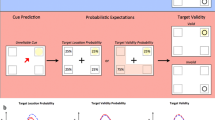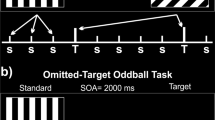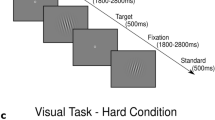Abstract
The P3b component of human event-related EEG potentials is larger with rare than frequent task-relevant stimuli. In a previous study, this oddball effect was much reduced when stimulus–response (S–R) mappings were still undefined at stimulus presentation (being later provided by response prompts). This reduction may reflect P3b’s dependence on transmitted information which might be any relevant information (informational value hypothesis) or, more specifically, information about how to respond (S–R link hypothesis). To distinguish between these two hypotheses and clarify their differences from classical stimulus evaluation hypothesis, we added a second dimension by presenting colored letters, with both colors and letters varying between a rare and a frequent alternative. Response prompts, presented half a second later, were, in different blocks, constant or variable across trials with respect to S–R mapping and with respect to the relevant dimension (color or letter). With partial information, when only one of these two factors is known at stimulus presentation (by being constant across trials), the hypotheses differ in their predictions. The oddball effect will be abolished according to S–R link hypothesis because knowledge of both factors is needed to determine the response, but will only be reduced according to informational value hypothesis and be fully maintained according to stimulus evaluation hypothesis. In fact, oddball effects only occurred with knowledge of both factors, i.e., if both the relevant dimension and its mapping to responses were constant across trials. These results confirm the preeminent role of knowledge about responses for eliciting P3.





Similar content being viewed by others
References
Brunia CHM (2003) CNV and SPN: indices of anticipatory behavior. In: Jahanshahi M, Hallett M (eds) The Bereitschaftspotential: movement-related cortical potentials. Springer, Heidelberg, pp 207–227. https://doi.org/10.1007/978-1-4615-0189-3_13
Callaway E (1983) The pharmacology of human information processing. Psychophysiology 20:359–370. https://doi.org/10.1111/j.1469-8986.1983.tb00915.x
De Jong R (1993) Multiple bottlenecks in overlapping task performance. J Exp Psychol Hum Percept Perform 19:965–980. https://doi.org/10.1037/00961523.19.5.965
Deiber MP, Ibañez V, Caldara R, Andrey C, Hauert CA (2005) Programming effectors and coordination in bimanual in-phase mirror finger movements. Cogn Brain Res 23:374–386. https://doi.org/10.1016/j.cogbrainres.2004.11.009
Desmedt JE, Debecker J (1979) Wave form and neural mechanism of the decision P350 elicited without pre-stimulus CNV or readiness potential in random sequences of near-threshold auditory clicks and finger stimuli. Electroencephalogr Clin Neurophysiol 47:648–670. https://doi.org/10.1016/0013-4694(79)90293-1
Dien J, Spencer KM, Donchin E (2004) Parsing the late positive complex: mental chronometry and the ERP components that inhabit the neighborhood of the P300. Psychophysiology 41:665–678. https://doi.org/10.1111/j.1469-8986.2004.00193.x
Donchin E, Coles MGH (1988) Is the P300 component a manifestation of context updating? Behav Brain Sci 11:357–374. https://doi.org/10.1017/s0140525X00058027
Duncan-Johnson CC (1981) P300 latency: a new metric of information processing. Psychophysiology 18:207–215. https://doi.org/10.1111/j.1469-8986.1981.tb03020.x
Duncan-Johnson CC, Donchin E (1977) On quantifying surprise: the variation of event-related potentials with subjective probability. Psychophysiology 14:456–467. https://doi.org/10.1111/j.1469-8986.1977.tb01312.x
Frith CD, Done DJ (1986) Routes to action in reaction time tasks. Psychol Res 48:169–177. https://doi.org/10.1007/BF00309165
Gaeta H, Friedman D, Hunt G (2003) Stimulus characteristics and task category dissociate the anterior and posterior aspects of novelty P3. Psychophysiology 40:198–208. https://doi.org/10.1111/1469-8986.00022
Gratton G, Bosco CM, Kramer AF, Coles MGH, Wickens CD, Donchin E (1990) Event-related brain potentials as indices of information extraction and response priming. Electroencephalogr Clin Neurophysiol 75:419–432. https://doi.org/10.1016/0013-4694(90)90087-Z
Hommel B, Müsseler J, Aschersleben G, Prinz W (2001) The theory of event coding (TEC): a framework for perception and action planning. Behav Brain Sci 24:849–937. https://doi.org/10.1017/S0140525X01000103
Johnson R Jr (1986) A triarchic model of P300 amplitude. Psychophysiology 23:367–384. https://doi.org/10.1111/j.1469-8986.1986.tb00649.x
Kok A (1978) The effect of warning stimulus novelty on the P300 and components of the contingent negative variation. Biol Psychol 6:219–233. https://doi.org/10.1016/0301-0511(78)90024-8
Kutas M, McCarthy G, Donchin E (1977) Augmenting mental chronometry: the P300 as a measure of stimulus evaluation time. Science 197:792–795. https://doi.org/10.1126/science.887923
Lakens D (2013) Calculating and reporting effect sizes to facilitate cumulative science: a practical primer for t-tests and ANOVAs. Front Psychol 4:863. https://doi.org/10.3389/fpsyg.2013.00863
Oberauer K (2010) Declarative and procedural working memory: Common principles, common capacity limits? Psychol Belg 50:277–308. https://doi.org/10.5334/pb-50-3-4-277
O’Connell RG, Dockree PM, Kelly SP (2012) A supramodal accumulation-to-bound signal that determines perceptual decisions in humans. Nature Neurosci 15:1729–1735. https://doi.org/10.1038/nn.3248
Ouyang G, Sommer W, Zhou C (2015) Updating and validating a new framework for restoring and analyzing latency-variable ERP components from single trials with residue iteration decomposition (RIDE). Psychophysiology 52:839–856. https://doi.org/10.1111/psyp.12411
Pashler H (1984) Processing stages in overlapping tasks: evidence for a central bottleneck. J Exp Psychol Hum Percept Perform 10:358–377. https://doi.org/10.1037/0096-1523.10.3.358
Pashler H (1994) Dual-task interference in simple tasks: data and theory. Psychol Bull 116:220–244. https://doi.org/10.1037/0033-2909.116.2.220
Polich J (2007) Updating P300: an integrative theory of P3a and P3b. Clin Neurophysiol 118:2128–2148. https://doi.org/10.1016/j.clinph.2007.04.019
Rohrbaugh JW, Syndulko K, Lindsley DB (1976) Brain wave components of the contingent negative variation in humans. Science 191:1055–1057. https://doi.org/10.1126/science.1251217
Ruthruff E, Pashler HE, Klaassen A (2001) Processing bottlenecks in dual-task performance: structural limitation or strategic postponement? Psychonom Bull Rev 8:73–80. https://doi.org/10.3758/BF03196141
Sawaki R, Katayama J (2009) Difficulty of discrimination modulates attentional capture by regulating attentional focus. J Cogn Neurosci 21:359–371. https://doi.org/10.1162/jocn.2008.21022
Scharf F, Nestler S (2018) Principles behind variance misallocation in temporal exploratory factor analysis for ERP data: insights from an inter-factor covariance decomposition. Int J Psychophysiol 128:119–136. https://doi.org/10.1016/j.ijpsycho.2018.03.019
Squires NK, Squires KC, Hillyard SA (1975) Two varieties of long-latency positive waves evoked by unpredictable auditory stimuli in man. Electroencephalogr Clin Neurophysiol 38:387–401. https://doi.org/10.1016/0013-4694(75)90263-1
Sutton S (1979) P300—thirteen years later. In: Begleiter H (ed) Evoked brain potentials and behavior. Plenum Press, New York, pp 107–126. https://doi.org/10.1007/978-1-4684-3462-0_4
Sutton S, Tueting P, Zubin J, John ER (1967) Information delivery and the sensory evoked potential. Science 155:1436–1439. https://doi.org/10.1126/science.155.3768.1436
Twomey DM, Kelly SP, O’Connell RGO (2016) Abstract and effector-selective decision signals exhibit qualitatively distinct dynamics before delayed perceptual reports. J Neurosci 36:7346–7352. https://doi.org/10.1523/jneurosci.4162-15.2016
Verleger R (1997) On the utility of P3 latency as an index of mental chronometry. Psychophysiology 34:131–156. https://doi.org/10.1111/j.1469-8986.1997.tb02125.x
Verleger R, Śmigasiewicz K (2016) Do rare stimuli evoke large P3s by being unexpected? A comparison of the oddball effects between standard-oddball and prediction-oddball tasks. Adv Cogn Psychol 12:88–104. https://doi.org/10.5709/acp-0189-9
Verleger R, Wauschkuhn B, van der Lubbe RHJ, Jaśkowski P, Trillenberg P (2000) Posterior and anterior contributions of hand-movement preparation to Late CNV. J Psychophysiol 14:69–86. https://doi.org/10.1027//0269-8803.14.2.69
Verleger R, Metzner MF, Ouyang G, Śmigasiewicz K, Zhou C (2014) Testing the stimulus-to-response bridging function of the oddball-P3 by delayed response signals and residue iteration decomposition (RIDE). NeuroImage 100:271–280. https://doi.org/10.1016/j.neuroimage.2014.06.036
Verleger R, Hamann LM, Asanowicz D, Śmigasiewicz K (2015) Testing the S–R link hypothesis of P3b: the oddball effect on S1-evoked P3 gets reduced by increased task relevance of S2. Biol Psychol 108:25–35. https://doi.org/10.1016/j.biopsycho.2015.02.010
Verleger R, Grauhan N, Śmigasiewicz K (2016a) Is P3 a strategic or a tactical component? Relationships of P3 sub-components to response times in oddball tasks with go, no-go and choice responses. NeuroImage 143:223–234. https://doi.org/10.1016/j.neuroimage.2016.08.049
Verleger R, Grauhan N, Śmigasiewicz K (2016b) Effects of response delays and of unknown stimulus–response mappings on the oddball effect on P3. Psychophysiology 53:1858–1869. https://doi.org/10.1111/psyp.12756
Verleger R, Siller B, Ouyang G, Śmigasiewicz K (2017) Effects on P3 of spreading targets and response prompts apart. Biol Psychol 126:1–11. https://doi.org/10.1016/j.biopsycho.2017.03.011
Walter WG, Cooper R, Aldridge VJ, McCallum WC, Winter AL (1964) Contingent negative variation: an electric sign of sensorimotor association and expectancy in the human brain. Nature 203:380–384. https://doi.org/10.1038/203380a0
Wild-Wall N, Sangals J, Sommer W, Leuthold H (2003) Are fingers special? Evidence about movement preparation from event-related potentials. Psychophysiology 40:7–16. https://doi.org/10.1111/1469-8986.00002
Funding
This work was supported by funding granted to R.V. from Deutsche Forschungsgemeinschaft (Ve110/17-1).
Author information
Authors and Affiliations
Corresponding author
Ethics declarations
Conflict of interest
The authors declare no competing financial and other interests.
Rights and permissions
About this article
Cite this article
Verleger, R., Keppeler, M., Sassenhagen, J. et al. The oddball effect on P3 disappears when feature relevance or feature-response mappings are unknown. Exp Brain Res 236, 2781–2796 (2018). https://doi.org/10.1007/s00221-018-5334-z
Received:
Accepted:
Published:
Issue Date:
DOI: https://doi.org/10.1007/s00221-018-5334-z




